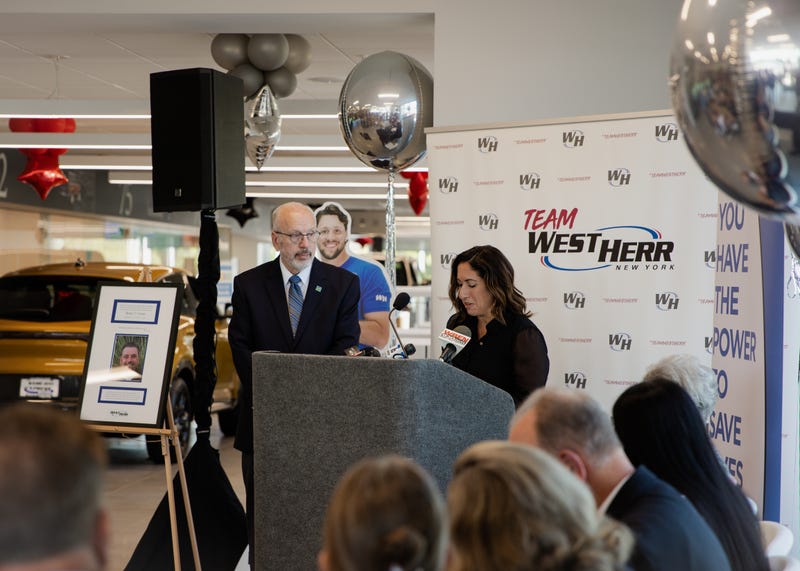
Orchard Park, N.Y. (WBEN) - "Brian's selflessness has inspired many in our family, myself included, to register to be an organ donor. We hope Brian inspires you to register as well, as he truly is our hero."
For more than 20 years, Brian Cosen was a beloved figure in the West Herr family, while also being a dedicated husband and father of his family. At the time of his untimely death four months ago at the age of 46, what was his family's worst day of their lives ended up becoming a blessing for two other families across the country.
"Unbeknownst to us, Brian was an organ donor. We did not discover this fact until we were in the ICU, preparing to say goodbye to Brian. All of a sudden, this woman, Katie, peaked her head in, explaining she was with Connect Life and that Brian was an organ donor. We had no idea," said Maria Cosen, Brian's wife during a ceremony on Monday at West Herr Jeep in Orchard Park. "It was just like Brian to register and not to say a word, as he was never one to seek recognition."
One of Brian's kidneys ended up being transplanted to a woman in need in Maryland, while his heart was donated to a man in Virginia.
"Rumor has it when the man awoke from his surgery with Brian's heart beating inside, he yelled, 'Go Bills!', as Brian was a loyal fan," Cosen said.
For those who knew Cosen, people spoke highly of his giving nature and huge heart for others. Scott Bieler, President and CEO of West Herr remembers his fun and loving personality, and the admirable way he lived his. He, too, was not surprised to learn of him being an organ donor upon his passing.
"His life ended much too soon, but none of us are surprised at all that he donated four of his organs to save the lives of others. That's just what he was all about, always for others," said Bieler on Thursday. "This selfless act has saved the lives of others, allowing his legacy of giving to endure, and to bring hope to those who need it most. A day does not go by that we do not think of Brian, and the contributions he made to our organization not only as a servant leader in this company, but as a man, a husband, a father who truly, truly loved his family."
Along with Bieler, other members of the West Herr family joined leadership from Donate Life New York State and ConnectLife, along with the New York State Department of Motor Vehicles and New York State Automobile Dealers Association to not just honor the life and legacy of Cosen on Thursday, but also to raise awareness about the life-changing impact of organ, eye, and tissue donation.
"There are about 8,000 New Yorkers who are waiting for a life-saving transplant today, as we're all standing here this morning. We are communicating and sharing that incredibly powerful thing that New Yorkers can do, which is sign up on the New York State Donate Life registry, just like Brian did," said Aisha Tator, executive director of Donate Life New York State. "And this message that we're sharing, and we're amplifying this here today, is emphasizing the importance, but it's also normalizing this decision. It's creating, what I call, a 'culture of donation' in New York state. I believe New Yorkers are incredibly generous, they're kind, they're there to help each other in a moment of need. And that if they just knew that we needed them to be somebody's hero today, they would sign up on the New York State Donate Life registry."
More than 103,000 Americans are currently on the waitlist for a life-changing organ. While organ donation saved nearly 3,600 New Yorkers in 2023, roughly 400 people on the transplant waitlist die each year due to a shortage of donors.
Over the past decade, Donate Life NYS has more than doubled the number of organ donors in New York – from 21% in 2013, to 48% today – but New York still trails far behind the national average of 64%.
"The gift of donation is incredibly important for the patients that I see every day," said Dr. Liise Kayler, program director of the Regional Transplantation and Kidney Care Center of Excellence at Erie County Medical Center. "At ECMC, mostly I see kidney patients, and a transplant really transforms their lives. When they come in to see me, they feel sick, they feel tired, they hate dialysis. And after a transplant, they get their energy levels back, they feel good, and they go on to live much longer lives than they would have if they had been on dialysis. Our goal is to provide transplants to as many people who can benefit from it, and we're pretty good at doing that. We did 151 transplants last year, but we can't do that life-saving work without donors, like Brian."
New Yorkers interested in becoming an organ donor can register now at DonateLifeNYS.org/register.
